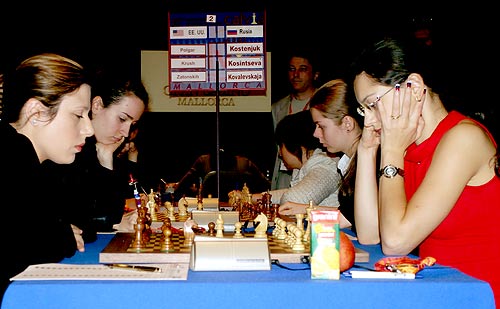Back to The Game of Chess...
As I let on in the History section, there has been from Muslim times on a firm chess elite. Chess seems to form its own community of bold characters where everybody knows the top dog. Furthermore, as demonstrated during the Soviet chess era, there are no boundaries for this chess elite. Frequently Russian players broke through the Iron Curtain to challenge a Western opponent, and vice versa. But what fundamentally distinguishes this class of person?
Surprisingly, the difference between a professional chess player and others from similar circumstances is hardly measurable at a cognitive level. Studies have been performed that demonstrated, for example, that the "spatial intelligence" of a person and his or her chess skill have no correlation. There also has been no conclusive test showing that certain people can perceive a greater depth of moves - in fact, champions are found to think no more than their poor-playing counterparts. The crucial hypothesis is that chess requires judgment and/or pattern recognition skills. Therefore, chess skill is for the most part learned - frequently by studying the famous canon of masterful games. This means that, as information distribution increases, we are only getting better and better at chess. In contrast to a computer, a chess master does not have to consider a wide range of moves, but rather immediately seeks a pretty good one. (1)
The chess community must be seen as a generational one. As you can tell from Chess: Character Studies, eras come and go in the play of chess where people may follow a certain style. Drastic shifts in play typically come from a rising young savant. These shifts have been attributed to the motivations for parricide - after all, a budding chess player must want to win and show authority that it is fundamentally wrong. The common viewpoint thus is that the chess community is led by a self-reinforcing elite of great masters who have authority and a firm grip on the chess of that day. The system is constructed to drive this certain class of people - the chessplayer - to rise and therefore gain a seat amongst the masters.
A chessplayer is, almost by necessity, an outsider from society. As I have said, the chess community is constructed to motivate one's rise in the game. However, no normal person (facing these great difficulties of study and practice) would feel obliged to stay in this system. Therefore Hartston and Wason devise that tension and nervousness are characteristic traits of the chessplayer. The driving force is a "fear of losing." The chessplayer must thus feel that, given his place in chess society, he must not lose it. Gaining this place is not trivial. Gaining stamina for continual advancement requires a certain amount of maturity going into the challenges that he or she will face. (2)
Once you've lost stamina, you are a goner in chess. It is plainly obvious that, at some age, any chessplayer will lose the cognitive mechanism to continue winning - or at least to play at a masterful level. (This is not news). However, there are a great many degrees of variance. The chessplayer enters into the fray with set goals for his or her career, and some come out of the sport having seen through their goals. In fact, there is a great deal of diversity in the year at which a chessplayer reaches his or her peak. Data shows that few players improve after the age of 30, but several continued into old age playing on a Master or (at least) near-masterful level. Although the loss of stamina is certain, the reaction to defeat is also highly variable. Some chessplayers disappear after losing it at the top, while some require a timeout, and others are unphased and continue their course of play uninterrupted. (3)
In summary, a chessplayer is not a regular human being, but rather a mathematically oriented person typically with insecurity. He or she plays to win. A casual player is almost always the exception.
- WR Hartston and PC Wason. The psychology of chess. p. 57.
- WR Hartston and PC Wason. The psychology of chess. p. 23-40.
- WR Hartston and PC Wason. The psychology of chess. p. 41-47.

